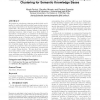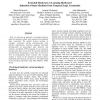73 search results - page 12 / 15 » Evolutionary Learning of Boolean Queries by Genetic Programm... |
119
click to vote
EGICE
2006
15 years 3 months ago
2006
Abstract. In knowledge representation by fuzzy rule based systems two reasoning mechanisms can be distinguished: conjunction-based and implication-based inference. Both approaches ...
SGAI
2007
Springer
15 years 5 months ago
2007
Springer
In this paper we describe a novel technique which implements a spatiotemporal model as a set of sub-models based on first order logic. These sub-models model different, typicall...
CIKM
2007
Springer
15 years 5 months ago
2007
Springer
We present an evolutionary clustering method which can be applied to multi-relational knowledge bases storing resource annotations expressed in the standard languages for the Sema...
187
click to vote
EH
1999
IEEE
1999
IEEE
Evolvable Hardware or Learning Hardware? Induction of State Machines from Temporal Logic Constraints
15 years 3 months ago
Here we advocate an approach to learning hardware based on induction of finite state machines from temporal logic constraints. The method involves training on examples, constraint...
108
click to vote
CEC
2010
IEEE
14 years 3 months ago
2010
IEEE
— If a population of programs evolved not for a few hundred generations but for a few hundred thousand or more, could it generate more interesting behaviours and tackle more comp...


